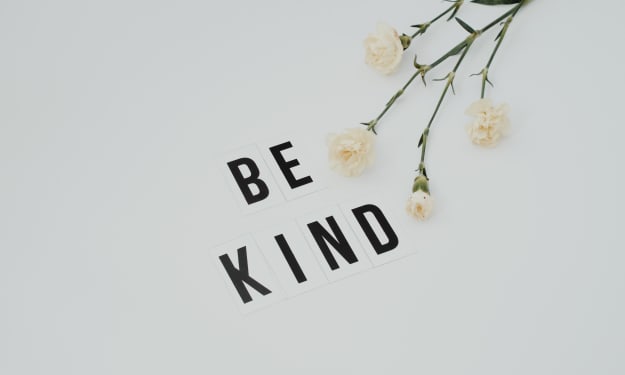Can Writers Be Apolitical?
Why Apoliticism in the Writing Space is (Mostly) a Lie

Short answer: no. No, they cannot.
Long answer: it's a little more complicated than that.
I find discussions of politics to be incredibly fascinating. Maybe it's because I study in a program heavily based on politics and write about current affairs every day. Growing up, I was privy to a phrase that rings in my ears to this day. Three things you never talk about: money, politics and religion. I have to say, even as a child, I thought this was a weird turn of phrase. On the smörgåsbord of interesting conversational topics, why is politics off limit? What about politics triggers our delicate sensibilities and makes such topics untenable?
These questions arose again for me recently (yesterday, in fact!) with the announcement of the jury's verdict in the Derek Chauvin Trial. Guilty on all charges! The verdict filled me and many others with a deep sense of catharsis, and I also felt a strange tangle of emotions that I can only meaningfully describe as "DUH!". We watched a grown man (a police officer at that!) kneel on another grown man's neck for over nine minutes, even after he had no pulse and defence expected us to believe that he died of a fentanyl overdose? Are you mad?

In the flurry of excitement that followed the verdict, a fellow creator posted a cheeky joke, saying that she asked the universe to let her lose one of Vocal's challenges in exchange for a guilty verdict. This ticked some people off and thus ensued some intense back and forth, a tasteless comparison to Hitler (randomly!) and a slew of loose justifications for why the creator should have left her political stance and social-justice-warrior-esque joke at the door. One response stuck out to me, though. A commenter explained that the post upset her because she expected the group to be an apolitical, safe space where she could "escape the hate and everything else in the world."
Ok. Let's unpack that. What is apoliticism? Is it possible to hold a truly apolitical stance? And most importantly, can writers be apolitical?
Apoliticism Explained
First and foremost: what is politics? According to my trusty friend, Wikipedia, the word 'politics' is a bastardization of the Middle French word politique, which can be traced back to the Greek words polis meaning 'city' and polites meaning 'citizens.' As for the semantic content of the word itself, that is a bit stickier. Cambridge Dictionary retains over six definitions of the word, all uniting around notions of governance, power and control.
"the activities of the government, law-making members, or people who try to influence the way a country is governed"
"the job of holding a position of power in government"
"the study of the ways in which a country is governed"
"someone's opinions about how a country should be governed"
"the relationships within a group or organization that allow particular people to have power over others"
This diversity of meaning occurs before we even get into the nuances between domestic and foreign politics or across different strands of politics such as sociopolitics, geopolitics, ecopolitics or the Political Economy. They are also empty of the various critical and analytical lenses through which academics typically view politics. But we won't get into that; it's mind-boggling and not the topic of this article. What, then, is apoliticism? Apoliticism is 'not politics.' Like words such as atypical, asymptomatic and asexual, it is simply the opposite of its root and the antithesis to everything I just described. An apolitical stance rejects or displays a deep aversion to the political.
True Apolitical Stances Are Rare
I don't know who needs to hear this but claiming to be apolitical to dodge uncomfortable political conversations is inherently a political move. Whether it is your intention or not, you convey an implicit message about your opinions and beliefs on, you guessed it, politics! Moreover, the argument can be made that our society consists of webs of intersecting political ideas that are so tightly woven it is nearly impossible to extricate oneself from them. Do you enjoy oat milk? Well, take care that your favourite eco-friendly brand isn't receiving dirty money from a company accused of actively destroying the Amazon. Are you wearing those new-new Nike sneakers? Let's not forget about the vulnerable women who had a hand in making them. Do you use a laptop, phone, tablet, or even an electric car (that's so environmentally friendly!). Consider the fact that all rechargeable batteries necessitate the extraction of cobalt, 60% of which is supplied by the Democratic Republic of the Congo, the poorest country in the world.
I say all this not to make anyone feel bad for their consumer choices. I believe the onus is on companies and politicians to scale moves towards greater change. However, every aspect of our lives (every single one) is ultimately conditioned by politics. Where we live. Who our neighbours are. The types of clothes we wear. The education we have. The employment positions we hold. This problematizes the attainment of true apoliticism. There is no escape from the throes of politics. When people claim to be apolitical, what they are really ascribing to in that moment is political quietism. Linked originally to various spiritual beliefs, philosophers adopted it to describe a sort of ethical minimalism wherein persons opt not to give their opinions on contemporary events but meet them with little resistance and withdraw from open political engagement. Quietism isn't the absence of politics like apoliticism; it is the unwillingness to engage meaningfully in political discussion.
Then, Can Writers Be Apolitical?
No. Writers are people, too. Our lives are not devoid of the effects of politics, so we cannot be apolitical. Well, what about fiction writers? Again, no. Even in the land of fantasy writing and alternate realities, writers bring their positionality and various biases that are conveyed through their craft. I've read a ton of literature for school, and professors always ask that we consider the context within which the author wrote the story. The art and the artist, if you will. Stories are not isolated from the material realities of our world. Try as we may, context slips through the cracks. I'm very good at creating a socio-political profile of writers based on the content of their writing. We all bring a bit of ourselves into our writing, and depending on the themes that poke through, I can tell you a fair bit about the hand that penned it. Intuitively, you can do this do.
---
This is by no means a call out for anyone that feels uncomfortable talking about politics. Discomfort is normal and understandable. I take issue with the idea that there exists any space on this earth where people can't bring the full context of who they are. Where our lived experiences don't matter and don't inform our interactions. Where our day-to-day decisions aren't necessarily indicative of a broader political structure that we often have no control over. Sorry to say, but such spaces are a thing of fantasy and self-delusion. Fair enough that you wish not to speak of politics, but please don't expect the rest of us to acquiesce gracefully, especially as writers. We are hardwired to vomit our feelings onto paper. It's our (political) nature.
---------------------------------------------------
If you liked this post, please be sure to like this post! If you're able to leave a small tip, it'd be greatly appreciated and also, feel free to check out some of my latest stories. I recommend starting with this one:
About the Creator
Laquesha Bailey
22 years old literally, about 87 at heart. I write about self care, university life, money, music, books and whatever else that piques my interest.
@laqueshabailey







Comments
There are no comments for this story
Be the first to respond and start the conversation.